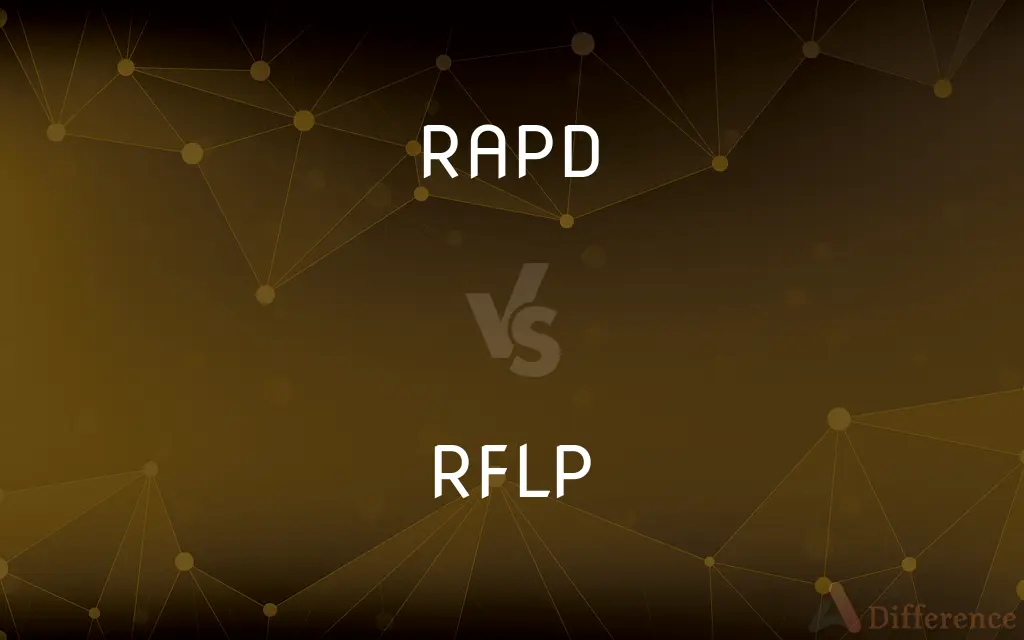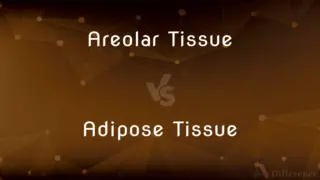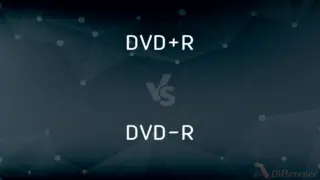RAPD vs. RFLP — What's the Difference?
Edited by Tayyaba Rehman — By Fiza Rafique — Published on December 5, 2023
RAPD (Random Amplification of Polymorphic DNA) is a PCR-based method using random primers; RFLP (Restriction Fragment Length Polymorphism) involves restriction enzymes to cut DNA at specific sequences.

Difference Between RAPD and RFLP
Table of Contents
ADVERTISEMENT
Key Differences
RAPD, or Random Amplification of Polymorphic DNA, is a technique that uses random primers for the polymerase chain reaction (PCR) to amplify anonymous stretches of DNA. RFLP, on the other hand, stands for Restriction Fragment Length Polymorphism, and it's a method that detects variations in DNA sequences by utilizing restriction enzymes.
In the RAPD technique, due to the use of random primers, the amplified segments are often random and don't require prior knowledge about the DNA sequence. In contrast, RFLP requires knowledge of the specific sequence where the restriction enzyme will cut, making it sequence-specific.
The advantage of RAPD is its simplicity and quickness, which allows for generating DNA profiles without needing to know the specific genetic markers beforehand. RFLP, meanwhile, offers a more reproducible and reliable method but might be time-consuming due to the need for specific probes and enzymes.
For RAPD, any variation in the sequence will affect the PCR amplification and hence, the pattern observed. For RFLP, variations in DNA sequences can create or abolish restriction enzyme recognition sites, resulting in different fragment patterns when DNA is digested.
Overall, both RAPD and RFLP are valuable genetic tools with distinct methodologies. While RAPD is more straightforward and faster, RFLP provides higher resolution and accuracy but requires specific sequence knowledge.
ADVERTISEMENT
Comparison Chart
Technique
PCR-based using random primers
Uses restriction enzymes to cut DNA at specific sequences
Sequence Knowledge Required
No prior knowledge needed
Prior knowledge about specific DNA sequences needed
Reproducibility & Reliability
Less reproducible compared to RFLP
Highly reproducible and reliable
Time & Complexity
Quick and straightforward
Can be time-consuming due to the need for probes & enzymes
Resultant Variation Impact
Affects PCR amplification pattern
Creates or abolishes restriction enzyme recognition sites
Compare with Definitions
RAPD
A tool for rapid genetic screening.
RAPD analysis revealed the genetic diversity within the population.
RFLP
A method identifying differences in homologous DNA sequences.
Through RFLP, we pinpointed the specific gene region responsible.
RAPD
A molecular method for assessing genetic variations.
The team utilized RAPD to understand the genetic relationships among the specimens.
RFLP
An approach to detect specific DNA sequence changes.
Using RFLP, researchers discovered the mutation causing the disease.
RAPD
A PCR technique using random primers.
Using RAPD, we identified genetic markers linked to the desired trait.
RFLP
A technique analyzing variations by fragment length differences.
RFLP studies shed light on the evolutionary relationships among species.
RAPD
An approach to detect genetic polymorphisms.
RAPD proved effective in differentiating between the plant species.
RFLP
A tool for DNA fingerprinting based on enzyme digestion.
Forensic scientists employed RFLP to match the evidence to the suspect.
RAPD
A method for DNA fingerprinting without sequence knowledge.
Researchers employed RAPD for a quick genetic analysis of the sample.
RFLP
A technique to detect DNA sequence variations using restriction enzymes.
The RFLP analysis showed distinct patterns between the two individuals.
Common Curiosities
How is RAPD different from RFLP?
RAPD is a PCR-based method using random primers, while RFLP uses restriction enzymes to cut DNA at specific sequences.
What does RAPD stand for?
RAPD stands for Random Amplification of Polymorphic DNA.
Do we need sequence information for RFLP?
Yes, RFLP requires knowledge of the specific DNA sequence where the enzyme will cut.
Is RFLP more accurate than RAPD?
RFLP is often considered more reproducible and accurate than RAPD.
What are the applications of RAPD?
RAPD can be used for DNA fingerprinting, genetic mapping, and studying genetic diversity.
And RFLP?
RFLP stands for Restriction Fragment Length Polymorphism.
Which technique is faster, RAPD or RFLP?
RAPD is generally quicker and more straightforward than RFLP.
Can RAPD and RFLP be used together?
Yes, both techniques can complement each other in genetic studies.
Is RAPD species-specific?
No, RAPD is versatile and can be applied across different species.
Is sequence knowledge essential for RAPD?
No, RAPD doesn't require prior knowledge of DNA sequences.
How do DNA sequence variations show in RFLP?
Variations can create or abolish enzyme recognition sites, leading to different fragment patterns in RFLP.
Why choose RFLP over other techniques?
RFLP provides high resolution and specificity, making it ideal for certain detailed genetic studies.
Where is RFLP commonly applied?
RFLP is used in forensic science, genetic disease diagnostics, and studying genetic relationships.
How do variations affect RAPD results?
Any sequence variation will impact the PCR amplification pattern in RAPD.
Are there any limitations to using RAPD?
Yes, RAPD may be less reproducible compared to methods like RFLP.
Share Your Discovery

Previous Comparison
Areolar Tissue vs. Adipose Tissue
Next Comparison
DVD+R vs. DVD-RAuthor Spotlight
Written by
Fiza RafiqueFiza Rafique is a skilled content writer at AskDifference.com, where she meticulously refines and enhances written pieces. Drawing from her vast editorial expertise, Fiza ensures clarity, accuracy, and precision in every article. Passionate about language, she continually seeks to elevate the quality of content for readers worldwide.
Edited by
Tayyaba RehmanTayyaba Rehman is a distinguished writer, currently serving as a primary contributor to askdifference.com. As a researcher in semantics and etymology, Tayyaba's passion for the complexity of languages and their distinctions has found a perfect home on the platform. Tayyaba delves into the intricacies of language, distinguishing between commonly confused words and phrases, thereby providing clarity for readers worldwide.
















































